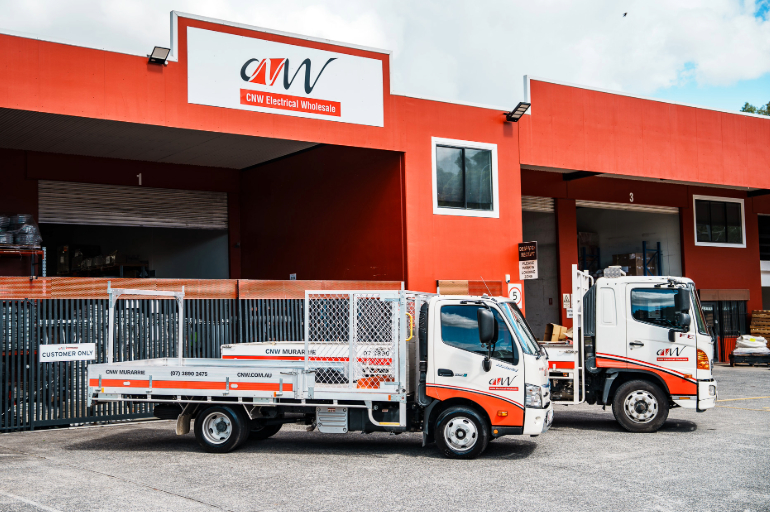Family owned and operated electrical wholesaler CNW opened its doors in 1952 and, while the world has changed a lot across the last 72 years, the company has ridden the technology wave the entire way. Now, it turns its sights to emissions reduction across its fleet of around 200 vehicles.
CNW invited Fleet HV News to its Murarrie warehouse in Brisbane, as the team welcomed three new Hino 300 Hybrid trucks to its growing fleet of trucks – with plans to replace outgoing runners with hybrid models.
“The price of hybrids has come down a lot, with hybrids versus the normal (diesel) truck price, so pretty much from our point of view we can start getting savings straight away with these,” CNW Asset Manager, Melinda Uhlmann explained.
Across the existing fleet of trucks and utes, with Toyota and Hino making up the bulk of the units, a few standout models have proven perfect for the delivery work CNW undertakes in both metro and regional areas.
“They’re pretty much all Hino 300 Series trucks now and mostly the 616 model, but we do go to a 921 for the rural regions where we have to go to mine sites,” Ms Uhlmann said.
“Over the years we’ve found Hino has had the best longevity for us, they’ve met our needs and we’ve got the relationships with the dealerships here.
“They go above and beyond when we need one about sourcing it and then they know our specs really well – it just makes purchasing easy for us.
“We get good resale too, especially in the market at the moment!”
The fleet approach at CNW is to run vehicles until maintenance costs start to creep, taking a calculated approach to replacement, with outgoing vehicles likely to be replaced by hybrid models into the future.
“We run a lean fleet and our owner’s motto is that if we can run the vehicle and keep it in good working order then we get the longevity benefits,” Ms Uhlmann said.
“So we run a ‘cost analysis versus kilometres’ structure that determines whether we replace a truck or not.
“We run a bit of a traffic light system, so if it’s running a low average service cost then it stays but once it gets up into the orange – that’s when we look at replacing it.
“The plan is to replace them with Hino Hybrids as they reach end of life,” she said.

While it’s too early for CNW to report on real-world fuel savings or emissions reductions for its Hino 300 Hybrid trucks, the company is focused on the future benefits of hybridising its fleet.
“The fuel saving and the CO2 savings are where we see the benefits for the company and we do certainly see future benefits for the company based on our analysis,” CNW Chief Executive, Simon Baynes said.
Despite being an electrical wholesaler, which happens to also sell electric vehicle chargers, CNW is set on hybrid vehicles at this stage based on the amount of rural kilometres they clock.
“I think the infrastructure needs to catch up a bit with the electric, because we do have a lot of remote locations and we would need to stop and charge, whereas with the hybrid you’ve got flexibility and then you can do long kilometres in them,” Ms Uhlmann said.
Ms Uhlmann’s advice for fleets considering a hybrid truck, perhaps due to range and residual value concerns associated with a dedicated battery electric vehicle (BEV), is to give it a go.
“I think it’s worth having a go with hybrids, even if you only get one or two for a couple of years to see what difference they make,” she said.
“From our point of view, when the cost became similar and we could also see benefits in fuel savings and co2 reductions, it made sense for us to go that way.”
When asked where she sees the fleet heading across the next five years, Ms Uhlmann says it is likely to consist mostly of hybrid vehicles – but she didn’t rule out the addition of BEVs.
“I definitely see the hybrid being our main truck purchase, because even when we need the larger truck they’ve now got that larger truck, because we get around that 8.5-tonne GVM as well,” she said.
“So from our point of view we can pretty much keep rolling Hybrids out right now as a business.”
The company hopes to add more true hybrid utes to its light vehicle fleet, too, with just one 48v mild hybrid Toyota HiLux added so far.
“Hopefully one day we get something in the ute space, so that we can get more hybrids into the fleet because we are heavily light vehicle based as well,” Ms Uhlmann said.
“We purchased one hybrid HiLux but it only really runs the accessories, so it’s just 48 volt.”
The sky’s the limit for CNW, as the company continues to grow in line with the rapid electrification of the modern world while also focusing on its approach to sustainability through fleet hybridisation.
“We’re always looking for growth and the industry is in pretty good shape, particularly the electrical industry with the electrification of the world and the massive opportunities there,” Mr Baynes said.
“At CNW Electrical Wholesale, sustainability serves as a foundational principle guiding our every decision and our unwavering commitment to the community drives us to pave the way towards a clearer, more sustainable world.”







